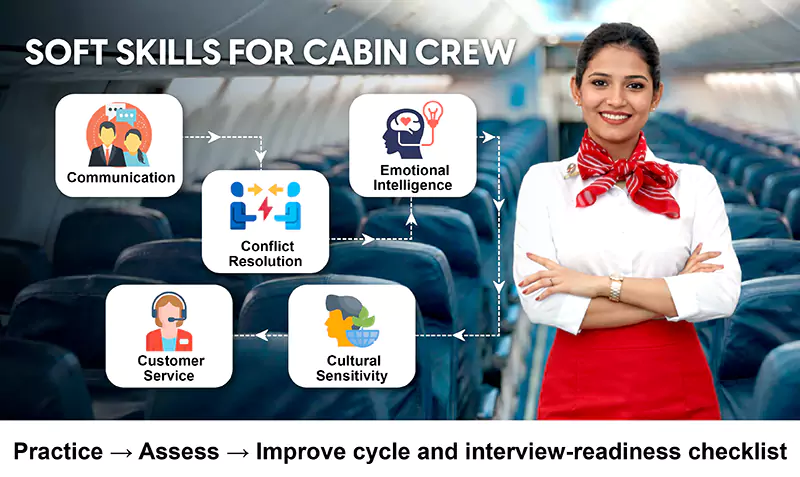Importance of Soft Skills Training for Cabin Crew
18 April, 2025 | By Frankfinn
Summary - Importance of Soft Skills
Choosing the right soft skills training can determine on-the-job performance and passenger satisfaction for aspiring cabin crew professionals. This overview explains how communication, conflict resolution, emotional intelligence, cultural awareness, and customer service together create a strong service profile for airline roles, and where structured training fits in the learning journey.
Soft skills are a crucial component of cabin crew training programs. Beyond operational knowledge, cabin crew members must possess exceptional communication and interpersonal skills to manage conflicts effectively and ensure a smooth, pleasant flight experience for passengers.
This article highlights the significance of soft skills training as an integral part of cabin crew courses, vital for building a successful career in aviation.
Enhancing Communication Skills
Passengers on flights come from diverse cultural and linguistic backgrounds. Therefore, effective communication is essential to understand and address their needs. Frankfinn Institute has designed its curriculum to strengthen communication skills, with a particular emphasis on English proficiency. The institute conducts group discussions, debates, and extempore sessions to improve students’ verbal and listening abilities.
As part of the training, students learn the value of active listening and are coached to interact clearly and confidently with passengers. Additionally, soft skills modules promote empathy and adaptability to language barriers, contributing to a seamless and comfortable travel experience for all onboard.
Conflict Resolution and Problem-Solving Abilities
In-flight conflicts may arise due to seat assignments, baggage concerns, or dissatisfaction with onboard services. Handling challenging passengers requires a calm, solution-oriented approach. Cabin crew must be equipped to resolve issues swiftly and professionally.
Frankfinn’s experienced faculty ensures students receive comprehensive training in conflict resolution. With over 10 years of industry experience, the institute's expert trainers offer practical insights, preparing students to face real-world challenges with confidence and competence.
Building Emotional Intelligence
Flight journeys can be stressful for passengers due to personal concerns, flight delays, or turbulence. In such scenarios, emotionally intelligent cabin crew members are better equipped to empathize and respond appropriately to passengers' emotional needs.
Teamwork is also essential. Every crew member plays a vital role in ensuring the smooth operation of the flight. Effective collaboration helps execute responsibilities efficiently and respond promptly to emergencies.
Fostering Cultural Sensitivity and Diversity Awareness
In today’s global aviation landscape, airlines cater to passengers from a wide range of cultural and ethnic backgrounds. Hence, it is imperative for cabin crew to demonstrate cultural sensitivity and inclusivity. The Frankfinn cabin crew course prepares students to thrive in multicultural environments, fostering respectful and professional interactions.
This aspect of training not only enhances the airline’s reputation but also contributes significantly to customer satisfaction and loyalty.
Delivering Exceptional Customer Service
Customer satisfaction is directly linked to the behavior, appearance, and professionalism of the cabin
crew. Through soft skills training, students learn how to exceed passenger expectations, delivering service that leaves a lasting impression.
Real-World Scenarios & Role-plays
Students practice how to talk to difficult passengers, service recovery after delays, and maintain safety during de-escalation through guided role-plays. These exercises in classroom help students to work under pressure and build confidence, which is essential for consistent in-cabin service delivery.
Assessment & Feedback Methods
Students’ progress is measured using different types of assessments for communication clarity, tone, empathy, and problem-solving. Such training improves performance across listening, response structure, and calmness under stress.
Employer Expectations & Placement Signals
Airlines often evaluate clarity of speech, service mindset, grooming, empathy, and conflict handling during interviews and group tasks. Students must know how to think based on scenarios and reflect on incidents after they have taken place, signaling job readiness beyond technical knowledge.
Career Outcomes & Roles
Soft skills help students get new opportunities across different aviation job roles like cabin crew, ground services, passenger relations, and premium lounge operations. These skills help students meet customer experience benchmarks that are central to airline brand reputation.



